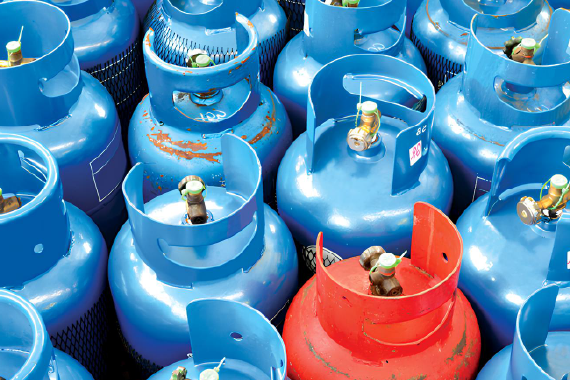We collaborate to achieve sustainable success
Get in touch with usThe Shadow Market: Combating Illegal Refrigerant Trade in a Tightening F-Gas Environment
As the global F-Gas phase-down accelerates through mid-2025, the legitimate refrigerant market is experiencing unprecedented supply shortages and escalating prices for traditional high-Global Warming Potential (GWP) refrigerants. This tightening environment, while crucial for environmental protection, has inadvertently created fertile ground for a dangerous and growing black market in illicit refrigerants. This shadow economy not only undermines the very goals of F-Gas regulations but also poses significant safety risks, financial penalties, and unfair competition for businesses striving for compliance.
The Genesis of the Black Market: Scarcity and Price Spikes
The stringent new F-Gas regulations, particularly the EU's aggressive HFC production caps and quota reductions, are the primary drivers of this illicit trade. From January 2025, the EU has limited HFC production rights to just 60% of their 2011-2013 baseline, creating a severe structural deficit for virgin HFC supply. This deliberate reduction, coupled with bans on certain high-GWP products and refrigerants for servicing existing systems, has led to a sharp increase in prices for substances like R-404A, R-134a, and R-410A.
When legitimate supply dwindles and prices soar, a vacuum is created that illegal operators are quick to fill. The allure of cheaper, readily available refrigerants, often smuggled or mislabelled, becomes a powerful temptation for businesses struggling to maintain operations and avoid the high costs of compliant alternatives or system upgrades. The presence of illegal refrigerant trade is explicitly recognized as a factor contributing to market unpredictability and undermining legitimate suppliers.
The Perils of Illicit Refrigerants
The risks associated with the black market extend far beyond mere non-compliance:
- Safety Hazards: Illicit refrigerants are often of unknown purity and composition. They may be contaminated with dangerous substances, incorrect blends, or even highly flammable gases, posing severe risks of explosions, fires, or toxic exposure during handling, installation, or operation.
- Equipment Damage: Using impure or incorrect refrigerants can cause catastrophic damage to HVACR systems, leading to costly repairs, premature equipment failure, and prolonged operational downtime. This negates any perceived short-term cost savings.
- Environmental Undermining: The primary goal of F-Gas regulations is to reduce potent greenhouse gas emissions. Illegal trade directly thwarts these efforts by reintroducing high-GWP substances into the market without proper controls, undermining global climate objectives.
- Legal and Financial Penalties: Businesses caught using or possessing illegal refrigerants face severe penalties, including substantial fines (up to £200,000 per offense in the UK), criminal charges, and reputational damage. Regulatory bodies are enhancing monitoring and enforcement, with increased digitalization and automation of customs control to combat illegal trade.
- Unfair Competition: Legitimate businesses that invest in compliance, proper training, and sustainable refrigerants are at a significant disadvantage when competing with those who cut corners by sourcing from the black market. This creates an uneven playing field and disincentivizes responsible practices.
Combating the Shadow Market: A Multi-pronged Approach
Addressing the illegal refrigerant trade requires a concerted effort from regulators, industry stakeholders, and businesses:
- Enhanced Enforcement and Monitoring: Regulatory bodies are strengthening their oversight. The EU F-Gas Portal, for instance, now integrates production rights data and quota allocation payment information from 2025, enhancing transparency and monitoring. Increased digitalization of customs control is also aimed at combating illegal trade.
- Industry Vigilance: Businesses must exercise extreme caution when procuring refrigerants. This includes verifying supplier credentials, demanding proper documentation (such as quota allocations and purity certificates), and being wary of unusually low prices.
- Promoting Reclaimed and Recycled Refrigerants: By increasing the availability and accessibility of legitimately reclaimed and recycled F-gases, the industry can offer a compliant and often more affordable alternative to virgin HFCs, reducing the incentive to turn to the black market.
- Education and Awareness: Raising awareness among end-users, contractors, and distributors about the dangers and legal consequences of illegal refrigerants is crucial.
- International Cooperation: Since illegal trade often crosses borders, international collaboration between customs agencies and environmental authorities is vital to disrupt smuggling networks.
The F-Gas phase-down in mid-2025, while essential for climate action, has inadvertently fuelled a dangerous shadow market. For businesses, the temptation of cheaper, illicit refrigerants is a false economy, leading to severe safety risks, equipment failures, and crippling legal penalties. By understanding the threats posed by the black market and actively supporting legitimate supply chains, including the growing circular economy of refrigerants, the industry can collectively combat this menace. This vigilance is not just about compliance; it's about safeguarding operations, protecting the environment, and ensuring a fair and sustainable transition for the entire cooling sector.

